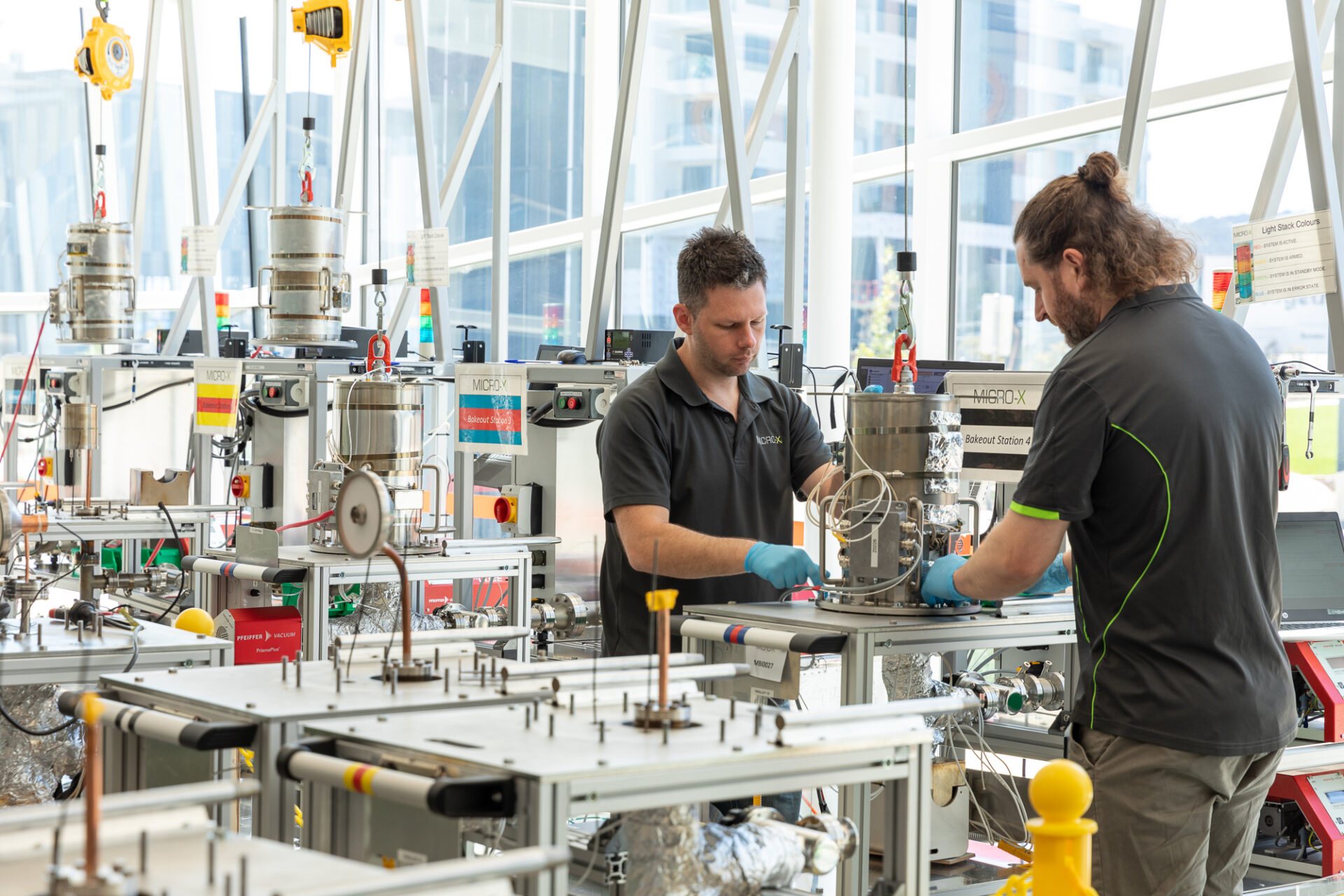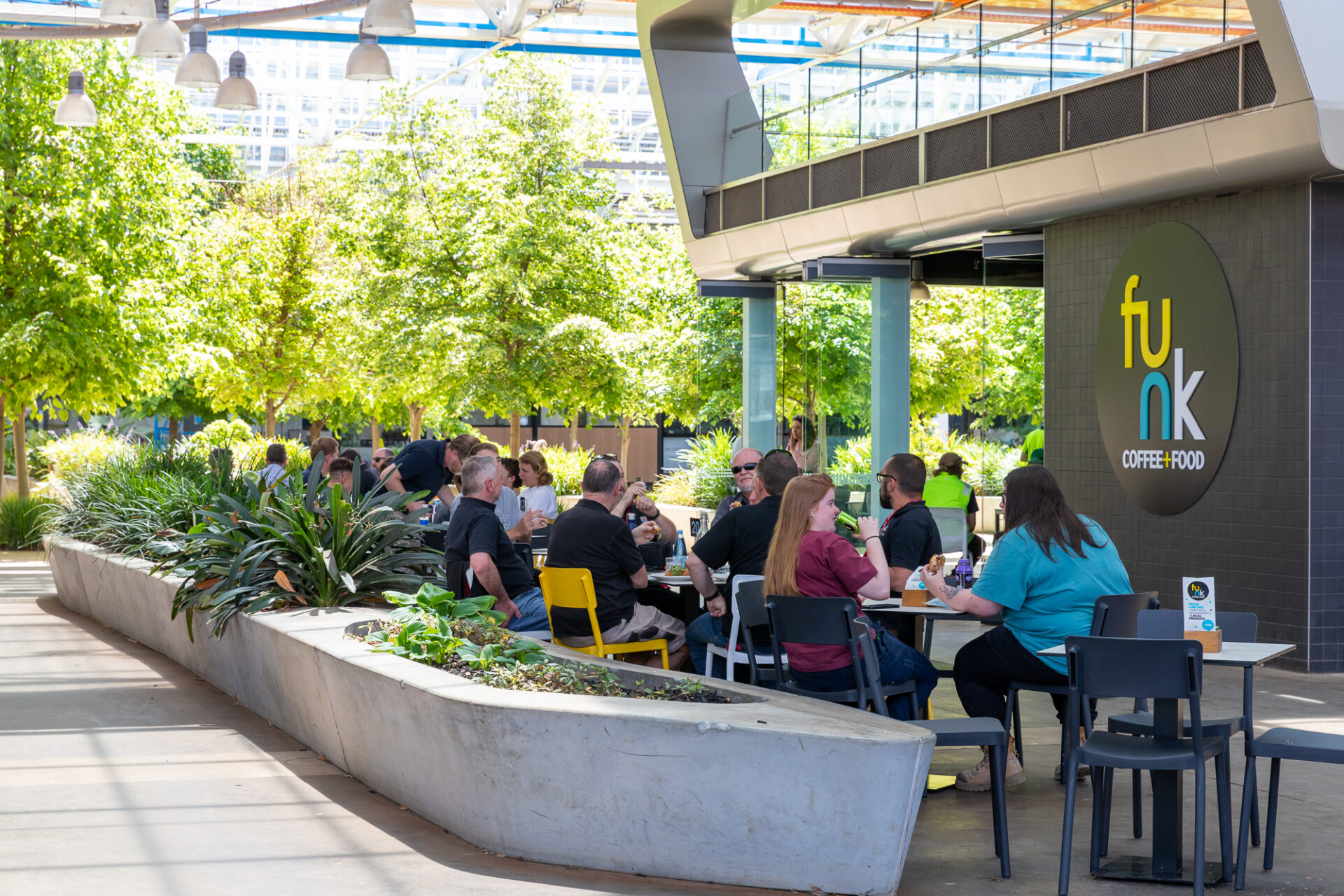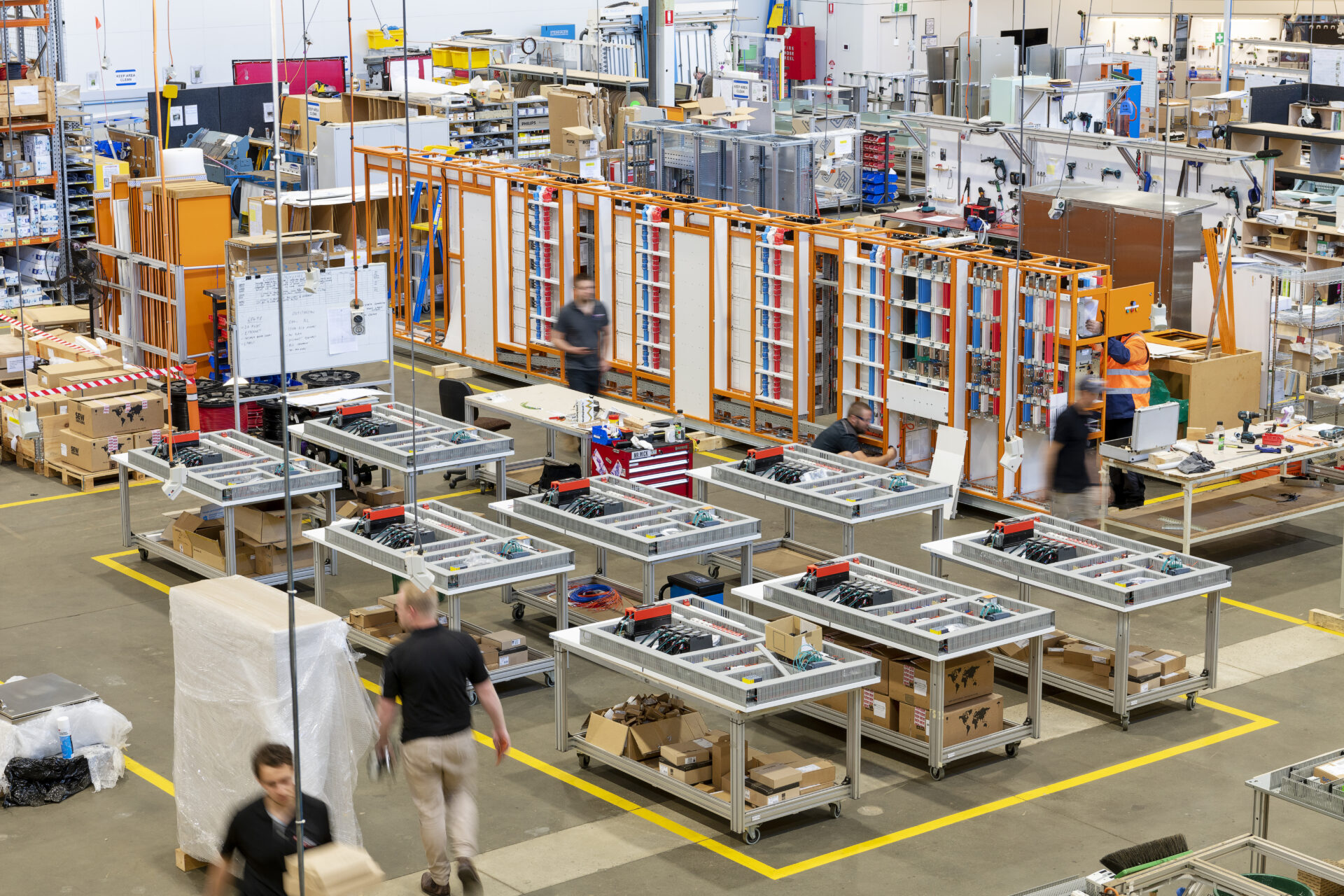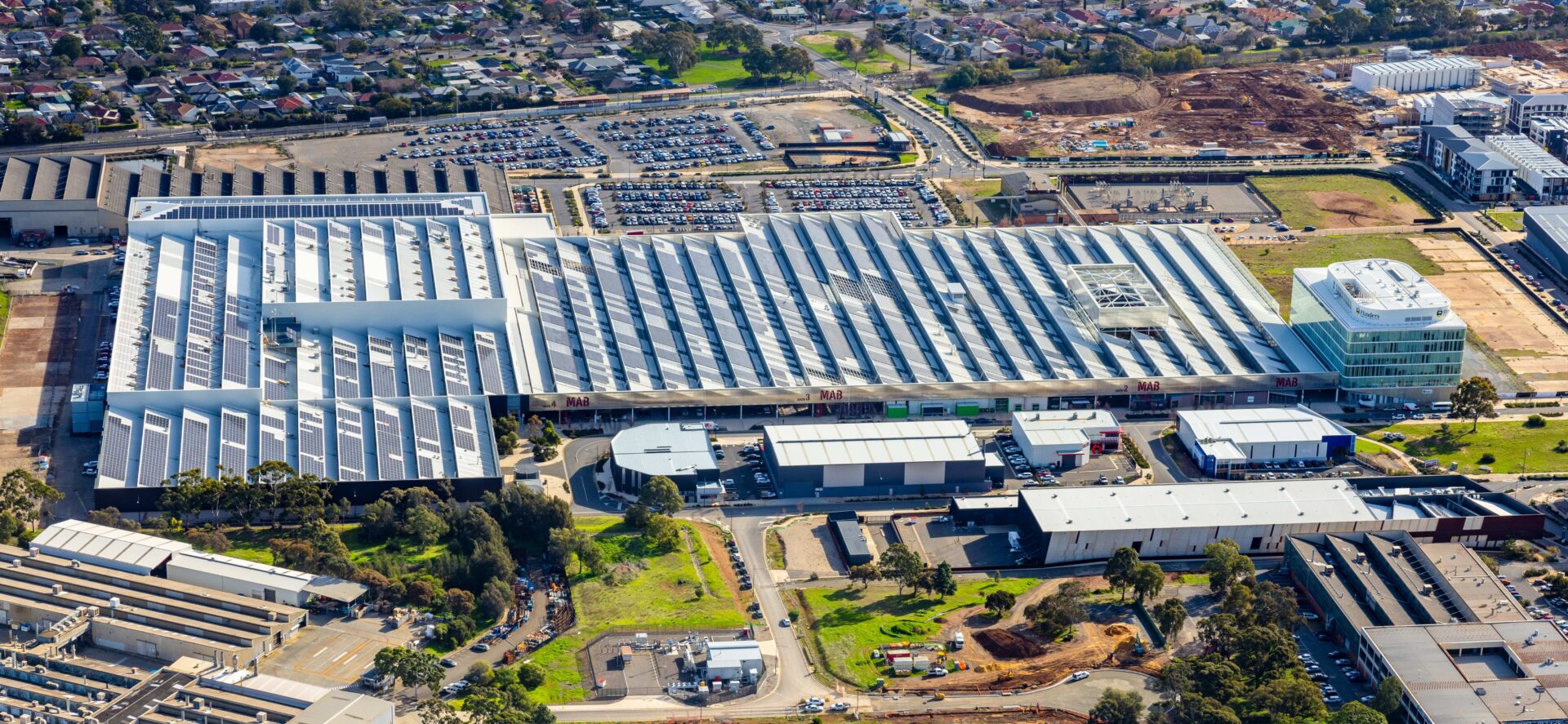Tonsley Innovation District celebrates 10 years of success – and counting

Tonsley Innovation District has surged into its second decade of operation, continuing its laser-focused commitment to driving innovation and energising the state’s economy.
The government-led District, located 12km from the city, has made dramatic strides since opening in 2012. From its initial remit to re-ignite a stalling manufacturing sector in Adelaide’s southern suburbs following the closure of the Mitsubishi plant in 2008, to now solving some of the world’s most complex problems through creative innovation, Tonsley has become a global benchmark for the successful re-use of a former industrial site.
As a hub for cutting-edge research and development, Tonsley has driven Adelaide’s transition from traditional to high-value manufacturing and with it, built out the state’s sovereign capability.
Around 2,000 people across 140 organisations are now employed at Tonsley – more than double than when Mitsubishi closed. 8,500 students’ study alongside this highly skilled and specialised workforce each year at anchor academic institution Flinders University, and TAFE SA. And more than 500 residents call Tonsley home as part of its growing community.
These livewire statistics reflect the substantial increase in scale, productivity, output, and economic impact of Tonsley in its first 10 years. What was once a 61-hectare industrial wasteland has become Australia’s most awarded innovation district, and a global leader in the effective co-location of industry, academia and SMEs around high value manufacturing.
"The State Government’s vision to transform the former Mitsubishi car plant into a world-class high-tech manufacturing hub has exceeded all expectations. The government's intervention to save the manufacturing industry in South Australia has paid off, with Tonsley driving the switch to high-value manufacturing. The District has attracted a large number of innovators, businesses and students, and has been recognised as Australia's most awarded Innovation District. Tonsley's success is a testament to the power of sustainable urban regeneration projects that foster innovation and collaboration between industry, academia, and government."
Minister for Trade and Investment; Minister for Housing and Urban Development and Minister for Planning, Nick Champion MP

Micro-X team members working in their technology lab at Tonsley
Leadership
From the outset, Tonsley called for world-class ambition. The Government of South Australia went about creating an environment whereby its unique product offering – namely its scalable facilities, networked community and ready access to research and technology – set it apart from traditional science and technology parks.
Deconstruction of traditional silos between government, higher education and industry was identified as critical to fast-track commercial success and transition to a knowledge economy. Supportive policies and institutions within the robust Tonsley ecosystem quickly encouraged the creation and dissemination of knowledge and leading-edge research between established businesses, start-ups, education providers, business incubators and accelerators, and the wider community in a single location.
This was a key catalyst in reviving the state’s manufacturing industry and in turn, future-proofing the state’s economy, because it not only created jobs of the future but generated a diverse and highly skilled workforce that was capable of operating at the highest level.
Tonsley’s Think together, Thrive together slogan is symbolic of the success of its Quadruple Helix model whereby the state at large is an active contributor to innovation, rather than being a passive recipient of its benefits.
Collaboration + culture
Tonsley’s tenant suitability matrix, whereby incoming businesses are curated to ensure they enhance the overall impact of the District, has cultivated an unrivalled environment for intentional collaboration. Creation of these strong trust-based networks has provided greater opportunities for knowledge sharing and given rise to collaborative partnerships via “open workshop policies”, where co-located businesses can utilise each other’s state-of-the-art facilities and draw on each other’s expertise.
As an incubator, Tonsley has actively sought to deliver “collision spaces” which encourage tenants to interact, whether that be shared lunch tables within one of the Main Assembly Building’s (MAB) urban forests or exercise activations such as the professional-grade squash court, jettisoned in from the 2006 Commonwealth Games. This deliberate placemaking offers unique opportunities for, and emphasis of, daily cross-sector collaboration at all levels.
Tonsley’s collaborative mindset has created an inclusive culture impervious to hierarchy. Knowledge is not exclusively held at the highest levels. Tonsley’s success comes largely from a willingness to share ideas, knowledge and know-how. Specialists from companies such as SAGE Automation, Micro-X and BAE Systems make the time to mentor and promote careers in STEM and can be found weekly in the basement of Tonsley’s Admin Building assisting budding young engineers at RoboRoos – South Australia’s Student Robotics Club.
Co-location has also established a platform for business growth and talent attraction. Having academic campuses on site provides direct access to a pool of trained, job-ready workers, enabling small businesses to rapidly upscale and push their solutions to the market. Similarly young jobseekers have a direct pathway to employment, stemming the historic “brain drain” that has crippled the state in the past.

Collision spaces under the MAB
Competitive advantage
Much of Tonsley’s competitive advantage and its positioning as a global leader in innovation comes from the strategic identification of four focus sectors – health, medical devices and assistive technologies; cleantech and renewable energy; automation, software and simulation; and mining and energy services.
During its inception, these sectors were seen as strengths for SA and areas of comparative advantage. Tonsley has now reached an age of maturity where pursuit of these areas has paid off. A wealth of highly skilled, highly trained and highly paid full-time jobs now exist within the District, something that would never have occurred if the site had been repurposed solely for large scale residential development or big box retail. Strong levels of commercialisation are being achieved particularly in areas such as cleantech, med-tech, robotics and defence, leading to a more resilient and prosperous state economy.
Tonsley has garnered a reputation as a District that can legitimately solve the world’s problems, substantiated by its recent induction as an inaugural member of the Global Network of Innovation Districts – a handpicked group of advanced 21st century innovation precincts seen as exemplars globally.
During a visit to Adelaide on 21 March, Julie Wagner, president and founder of The Global Institute on Innovation Districts, which curated the network, described Tonsley as a “phenomenal example” of a thriving innovation district, and one worthy of replication globally.
Problem solving + successes
Over the past decade, Tonsley has helped forge national and international markets for locally made and developed products and technologies. For example:
- SAGE Automation manufacture the control panels used in self-service bag drop at Singapore’s Changi Airport. Its technology controls the electronic lane change sequencing on the Sydney Harbor Bridge, assisting the traffic flow of some 160,000 vehicles per day, and its automation helps make the cult Aussie biscuit, the Tim Tam
- the power consumption of the MCG is managed by AZZO
- Micro-X’s light weight x-ray machines are supporting doctors on the front line of the war in Ukraine
- Zeiss developed the globally recognised UV-Protect – a coating for optical lenses providing sunglass-level protection
- robots created by Accurate Dosing Systems assist in the formulation of some of the world’s top selling fragrances and flavours
- Link Assistive’s eye gaze technology devices allow non-verbal people, or those with severe physical challenges such as MND or Cerebral Palsy to communicate simply by looking at an iPad
- BAE Systems and Flinders University’s Factory of the Future acts as an advanced manufacturing test bed, using innovation, Industry 4.0 technologies, research and training to find ways to make Osborne the safest and most productive shipyard in the world
- X-Frame’s modular wall framing system, commercialised and manufactured at Tonsley, is being used in the custom fit out of ANZ bank branches across the country
- Hydrogen Park South Australia kicked off the nation’s hydrogen economy with Australia’s first green hydrogen production facility; and
- Ziptrak’s patented blinds are utilised at Roland Garros, home of the French Open.
The list of proof points for Tonsley’s success goes on and on.

Sage Automation at Tonsley
"In many ways Tonsley Innovation District has led the resurgence of the state’s manufacturing sector; it has scooped up much of the Mitsubishi and Holden manufacturing talent and steadied an industry, transitioning it into something far greater than what I think anyone imagined; it’s paved the way for a state humming with high-tech capability, one that is now being called upon to deliver projects of national significance, like the country’s new fleet of nuclear-powered submarines. Tonsley as an incubator has shown the world what South Australia is capable of."
Minister for Trade and Investment; Minister for Housing and Urban Development and Minister for Planning, Nick Champion MP
Market drivers + economics
By the very nature of its innovation roots, Tonsley is agile and has been quick to respond to market drivers such as the COVID-19 pandemic, which exposed a greater need for sovereign capability.
Lateral thinking from companies like Form Cut Australia, which moved to Tonsley during the pandemic, allowed it to pivot from making specialist packaging for the defence sector to developing PPE for ICU doctors and essential workers.
Fellow Tonsley tenant, Specialised Solutions – a modular building and smart furniture manufacturer – helped design and build nine temporary COVID-19 treatment units for the Women’s and Children’s Hospital in a similar response to a changing market need.
Tonsley has also answered the global call for cleaner energy sources. It is home to Hydrogen Park South Australia (HyP SA) – Australia’s largest electrolyser and the first to deliver a renewable hydrogen blend to customers on the existing gas network – putting it at the forefront of the nation’s hydrogen economy. A pioneering endeavour, the $14.5m project also ships green hydrogen to the Whyalla Steelworks in regional SA.
This decade of inspired innovation has been underpinned by approximately $300 million in state government investment, a large portion of which will be recouped through project-generated sales and leasing income. That initial government input has attracted more than $395 million in delivered or committed private sector investment to date – a figure that it targeted to reach $1 billion by the end of project’s lifecycle.
This impressive financial support demonstrates confidence in Tonsley as a standalone economic development initiative and as an ongoing economic growth engine.
Infrastructure + sustainability + amenity
Renewal SA has so far unlocked 48.5 hectares of Tonsley’s 61-hectare footprint, including the award-winning MAB, which has set a new benchmark for sustainable urban regeneration projects nationally.
The 5-hectare outer shell of the MAB was strategically retained from its assembly line days and adapted into a magnetic and accessible space peppered with lush urban forests, placemaking, services and easy links to Adelaide’s rail network and greenways. The result is a true ‘centre of gravity’ within the District, not only for the dozens of businesses and students who work and study there, but for the wider community, which over time has come to utilise it as a place of gathering and connection. Weekends at Tonsley are now filled with community events, citizenship ceremonies, birthday parties and rite-of-passage moments for young children learning to ride their bikes on the MAB’s vast concrete floor.
On the MAB roofline, 13,000 solar panels have been linked up to a District-wide energy scheme, capable of producing up to 80% of Tonsley’s current energy needs.
Throughout the last decade, Tonsley has advanced sustainable transport endeavours by hosting autonomous bus trials. It has welcomed Tesla’s service and maintenance hub, which is responsible for optimising the capabilities of Tesla Powerwalls used in some of the world’s largest battery storage facilities. And it’s demonstrated its continued environmental commitment through the planting of some 42,513 plants and trees site wide.
At a grassroots level, Tonsley continues to evolve as a true live, work, play precinct. More than 500 residents have already moved into terrace homes and apartments at PEET Limited’s residential development, Tonsley Village. This number is expected to grow to around 1,800 at project completion.
Accessible and walkable, Tonsley bedded down its world-class reputation with the opening of the four-star, 88-room boutique hotel, La Loft, in 2023. And it will soon experience an explosion of retail activity with a $47 million lifestyle and hospitality precinct contributing to its realisation as a vibrant, mixed-use district. The Mitsubishi car plant’s old Boiler House will also be repurposed into a microbrewery.

MAB roofline with 13,000 solar panels
What’s next?
Tonsley’s first decade has been a success by every measure.
Incredibly, it is just over halfway through its 20-year masterplan. The District will continue to grow significantly over the next decade with the delivery of key retail amenity and streetscape. Renewal SA aims to complete its capital works program by early next year, including the milestone project of completing the ring road around the MAB. The last allotments outside of the MAB are earmarked for market sale by 2028, three years shy of Tonsley’s 20th year.
A 10-megawatt battery, managed by CleanPeak Energy, will shortly be installed in the District in a further boost to Tonsley’s environmental credentials. The battery will capture, store and release excess energy created from the large-scale solar array on the MAB roof.
Employment pathways for Year 10 to 12 students will become clearer from 2025 with the addition of a new technical college operating in collaboration with Flinders University. The college, which will have a focus on innovation and support students to complete their SACE while getting a vocational education and training (VET) qualification, is intended to deliver a pipeline of skilled staff to Tonsley businesses and beyond, that are well equipped to take on jobs of the future.
During the next 12 months, a new long-term governance model for Tonsley will be defined as the state government further refines its desire for a strategic and coordinated approach to the management of South Australia’s innovation districts and economic zones.
This state-wide Innovation District Framework will provide new scope for Tonsley to grow its impact, leverage opportunities and attract more investment as the entire state capitalises on its multi-billion-dollar AUKUS nuclear submarine deal. The new model will foster stronger connections between Tonsley, Lot Fourteen, Adelaide BioMed City, Osborne Naval Shipyard, Edinburgh Defence Precinct, Waite Research Institute and the future Australian Space Park in a bid to unlock value and supercharge innovation.
All the while, Tonsley continues on its mission to problem solve through collaboration of a trusted community and network. Its momentum will have an international focus, confidently expanding its reach to attract top talent and investment and raise the state’s profile globally for sustained economic return.
"Tonsley has become a benchmark globally, driving excellence and executing an Innovation District model where like-minded organisations have found common ground and formed partnerships that may not otherwise have been possible outside of the District. I have no doubt that over the next decade - and beyond - Tonsley will continue to attract visionary businesses doing ground-breaking research and development and creating innovative solutions that will deliver jobs for generations of South Australians both inside and outside Tonsley’s boundary. "
Renewal SA Chief Executive Chris Menz
Stay up to date with the latest news, developments events and activities at Tonsley Innovation District